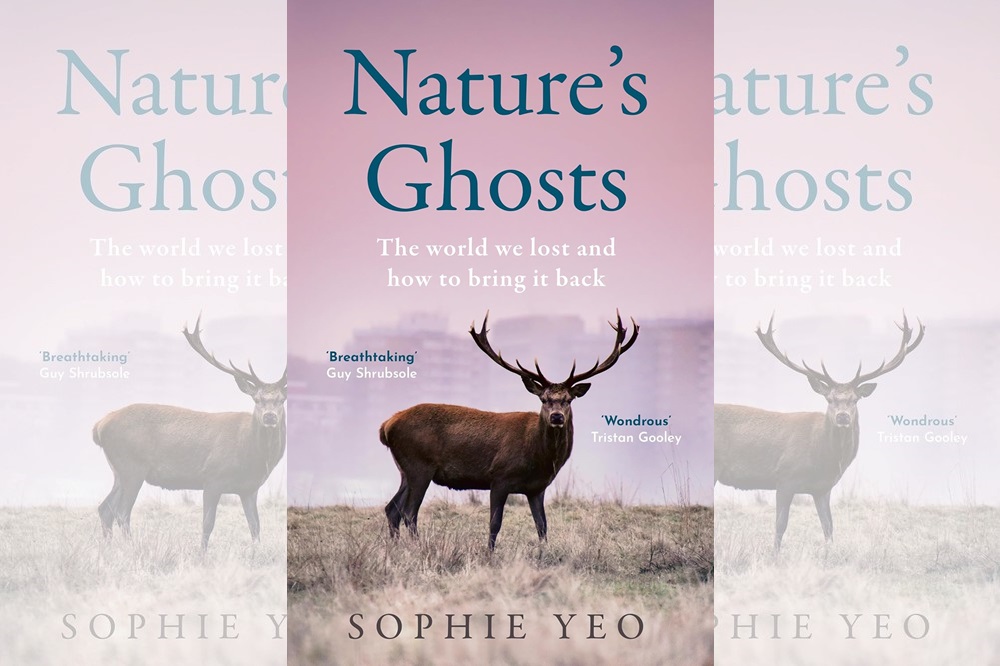Book review: Nature’s Ghosts by Sophie Yeo

Jon Gower
This thoughtful book looks to the past for lessons history can teach us if we are to avoid ecological catastrophe. In so doing author Sophie Yeo takes us way, way back to deep time.
She also ranges widely as she maps out the geography of Nature’s Ghosts, travelling to meet fishermen who work on frozen lakes in Finland, finding saintly stories alongside pheasant shooting in the Tanat Valley in north Wales and visiting the Vile, the rows of medieval fields on the edge of Gower near Rhossili.
Here the National Trust decided to restore the place to what it would look like centuries ago. With archaeological help they reassembled the pieces of an open-field system which had almost been lost as small fields were amalgamated into bigger ones.
The experiment reaped rewards in terms of biodiversity as Yeo finds out when she visits:
The fruits of their efforts scuttled and scurried before me. A weasel darted across my path and a whitethroats sang from the thistles. Hen harriers had returned to hunt in the fields left fallow and the predatory larvae of oil beetles lay in wait for the bees among the flowers. Common fumitory and mustard had sprung up from the disturbed soils.
Biodiverse forests
There is plenty here to ponder as we walk among Nature’s Ghosts, such as the economic value of wild produce as a way of diversifying income and increasing biodiversity at one and the same time.
As she suggests ‘In tending these landscapes for timber alone, managers overlook an opportunity for both nature and people. In the long run, a forest flowing with nuts, berries, fungi and herbs may well be worth more than a stand of desiccated stumps.’
She cites examples of continental foragers who gather truffles, birch sap, conifer resin and wild thyme – products destined not only for the dinner table but for use in decoration and in medicine.
Eagles
Some of her approaches are fascinating, not least the way she follows literary clues, such as those to be found in the medieval Welsh poem Canu Heledd, The Song of Heledd, written sometime between the eighth and the tenth century.
It tells of battles and the loss of a princedom but also describes a pair of eagles which flap in to gorge on the flesh of slain warriors.
Being fish-eating birds of prey, it’s been suggested that these might have been white-tailed sea eagles, a species proposed for reintroduction into Wales.
Yeo looks for other historical evidence of such birds, in place names such as Craig yr Eryr, whilst also noting the scepticism of ornithologists such as Dewi Lewis who asked ‘Does this mean that it is a rock where eagles were common or a rock where one eagle was seen and that this was considered an exception, a one-off event that needed to be recorded and remembered?’
Existential
But even as she ponders the past Yeo speculates about the future, and here she has to negotiate the perils of getting existentially gloomy, as she deals with reminders that ‘even our moments of optimism, our success stories, our most ambitious targets, have failure baked into them.’
So even as she tells us about successful conservation rescue missions, such as that of the European bison, which now survive deep in the Polish forests, she reminds us that they once roamed free and wild over much more and open territory.
It’s a tale of survival, yes, but also of retreat.
Losses
The nature of the subject, or maybe that should be the subject of nature, requires Yeo to employ some of the eco-terminology and concepts of the times, which, she readily concedes, can be depressing stuff.
There is ‘shifting baseline syndrome’ for example. This ‘describes how the goalposts of nature are constantly moving: we assumed that the landscape of our childhood was rich and wild, measuring any losses against that memory.
The next generation does the same – except this time, the landscape of childhood is already a little less rich, a little less wild.’
There’s a whole lexicon that has come into being to help us register the whittling away of nature and discuss the climate emergency as it turns into catastrophe. Biophilia. Red Data species. Shadow biodiversity. Rewilding. Refugee Species Hypothesis.
Sophie Yeo manages to assemble her stories and unroll various ideas with a sure sense of balance, skirting around the sensational, always keeping a level head as she searches for ‘the world we lost’ and ponders ‘how to bring it back.’.
There is much here to educate and provoke sensible discussion about the weightiest and most urgent matters of our age.
It is no mean feat to achieve all this in such an insistently readable book, quietly composed of considered, wise and pellucidly written prose.
Nature’s Ghosts by Sophie Yeo is published by Harper North and is available from all good bookshops.
Support our Nation today
For the price of a cup of coffee a month you can help us create an independent, not-for-profit, national news service for the people of Wales, by the people of Wales.





